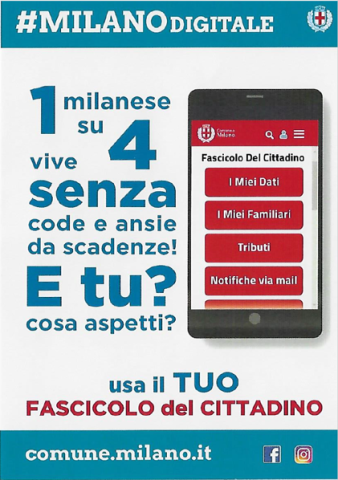Fascicolo del Cittadino: digital citizen folder app - Milan
Milan (Italy)
The Digital Citizen Folder App is one of the tools launched by the Municipality of Milan to put services “in the pocket” of its citizens. The application was built to meet citizens where they are and how they want to do business – faster and on-the-go. The App allows direct, fast and customised communication between the administration and citizens.
This project is a cornerstone of the mobile-first and user-centric approach Milan’s digital agenda. Along with the City’s “Interoperability Plan”, connecting the city’s many databases, the launch of the Digital Citizen Folder App solidified the City’s new digital foundations, allowing other innovations like the “City Dashboard” to be fully exploited.
The app acts as a personal repository of citizens’ documents, ranging from vital records to voter registration cards. In addition, it allows digital transactions like scheduling in-person appointments, the visualisation of personal data for the individual and their family, downloading certificates, reporting complaints and requesting assistance. One of the main features of the Folder App is related to payments. For istance, a specific service is devoted to allerts and payment (at a reduced fee) of parking fines received due to unpaid or unauthorized parking. Citizens contribute to this function by registering their license plate in the application, thus enriching the database that is behind the mechanism.
This two-way communication channel helps digitally savvy citizens save time and money and frees up traditional channels, like the City’s helpline (020202) for those without the skills or access to digital services. It also allows citizens to share feedback and ideas with the municipality to further improve online services.
The City’s Analytics team assesses citizen’s online requests to focus on the most demanded services.
Over 100 citizens helped in the startup phase of the application and the feedback gathered helped to make the first version of the app more user-centric and improved.
The App is now a fully digital way to communicate with the Municipality, providing information in a fast and secure way.
Privacy is guaranteed by the login process, which includes biometric features.
Many processes have been simplified over time, including the payment of fines and local taxes, reducing the use of paper for postal services and cutting costs for both citizens and the Municipality.
Today, citizens have an instant communication channel at their fingertips to request assistance with any user-related issue and to provide feedback on the App.
For instance, since 2018, the Municipality has decided to adopt a paperless approach to parking fines, which has allowed for a reduction in costs, which has also been reflected in reduced fees for citizens (the reduced amount corresponds to the cost of sending the fine). Today, up to the 80% of fines are paied daily via the App.
A similar process applies to local taxes, which can be viewed and paid digitally.
The App is also used to collect feedbacks, and the recently added functionalities (e.g. monitoring the licence plates of leased cars) have been highly requested by users.
This mix of competencies, ranging from technology to public communication, was one of the keys to a successful implementation.
To build the system around the needs of users, a group of 100 volunteers participated in the beta-testing phase of the app in February 2020, along with 140 internal employees.
Since then, the Municipality has continuously integrated opinions and feedback from users, private companies, and organisations to deliver the best version of this tool.
